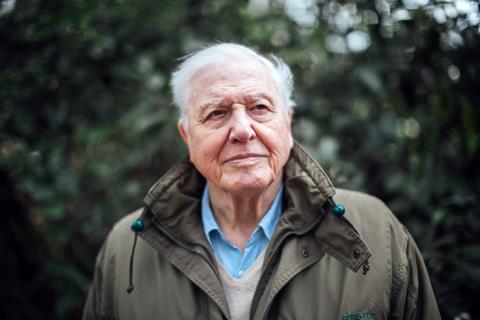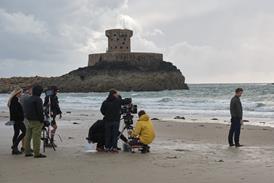Grandee lends support to campaign asking ’what’s changed’ since ministers last ruled out privatisation

Sir David Attenborough has lent his support to an open letter asking “what’s changed” in the four years since the government concluded Channel 4 was best kept in public hands.
The grandee, along with former chair of the BBC Trust Michael Lyons, filmmaker Mobeen Azhar and Small Axe producer Tracey Scoffield, have co-signed the letter to culture secretary Oliver Dowden asking for him to set out the “evidential basis to support such a dramatic shift in policy”.
Penned by Cardiff Production founder and chair of lobbying group British Broadcasting Challenge Pat Younge, the letter references former culture secretary Karen Bradley conclusions in 2017 regarding a sale of the PSB: “C4’s public service remit and support for the independent production sector across the UK are vitally important - and we have concluded that these are best served by keeping Channel 4 in public hands.”
It flags privatisation’s “far-reaching consequences for [C4’s] remit, the jobs it supports across the UK and for the whole UK PSB and production ecology” and calls for complete transparency surrounding its decision-making. This includes making available a copy of the agenda of any panel meetings that have discussed the issue, the names of any organisations or individuals that presented and the nature of the presentations made.
The calls follow a previous letter, signed by 120 luminaries, which centred around ensuring that the government’s Future PSB panel is open about its discussions and recommendations. The findings of that body, along with Ofcom’s Future PSB review and the results of the C4 consultation will be presented in a government white paper in the autumn.
The letter went on: “We believe PSB is too important to us all to be tainted by any sense of party politics or political agenda. We believe transparency and public debate are the best way to build a broad public consensus for the outcomes of any review.”
It also highlighted concern from DCMS Committee chair Julian Knight about the “lack of clarity” surrounding the decision to re-run the process to find the next Ofcom chair.
British Broadcasting Challenge: open letter to culture secretary Oliver Dowden
Dear Secretary of State,
I am writing to you further to my open letter of May 19th on behalf of the British Broadcasting Challenge. We are calling for an open and transparent debate on the future of public service broadcasting and our original letter was supported by over 120 prominent Britons from all areas of public life and civic society.
Sir David Attenborough, CH, OM, FRS, a world-renowned public service broadcaster and naturalist, voted most trusted man in Britain, has now joined this call for a broad public debate over the future of the public service broadcasting ecosystem he has helped to create. Others who have joined the campaign in recent days include:
- Patrick Barwise, Emeritus Professor of Management and Marketing (London Business School)
- Mobeen Azhar, journalist and filmmaker
- Sir Michael Lyons, Chairman of the BBC Trust, 2007-11
- Tracey Scoffield, television and film producer
- Simukai Chigudu, Associate Professor of African Politics (University of Oxford)
When you recently appeared in front of the DDCMS Select Committee you said that the PSB Review Panel would consider the future of Channel 4 in the week beginning May 24th. The report in The Times, 1 June, that banks have already been commissioned to evaluate the prospects of a potential sale of Channel 4, indicates that privatisation is firmly on the agenda.
Perhaps we could remind you that it was a previous Conservative Home Secretary of vision, William Whitelaw, who oversaw the creation of C4 and, following a review just four years ago, one of your Conservative predecessors, Karen Bradley, concluded: ”Channel 4’s public service remit and support for the independent production sector across the UK are vitally important - and we have concluded that these are best served by keeping Channel 4 in public hands.”
Privatisation of Channel 4 is such a major decision with far-reaching consequences for the channel’s remit, the jobs it supports across the UK and for the whole UK PSB and production ecology, that it begs the question: “what’s changed?” What is the evidential basis to support such a dramatic shift in policy? Therefore, in the interests of transparency and open government, and to understand the factual basis for this shift, can we ask for a copy of the agenda of any panel meetings that discussed this issue, the names of any organisation(s) or individual(s) that presented to the meeting and the nature of the presentation(s) made?
This announcement comes just days after the decision to re-run the OFCOM chairmanship selection process, and we note that Julian Knight MP, the Conservative Select Committee chair has expressed his concern about the “lack of clarity”, a concern we share with many others.
We believe PSB is too important to us all to be tainted by any sense of party politics or political agenda. We believe transparency and public debate are the best way to build a broad public consensus for the outcomes of any review.
In our letter of May 19th we requested a meeting with you to explore how we could support and enable that broader, public debate to take place and Armando Iannucci repeated that request at our launch event. Absent a reply from your office, we repeat that offer today and hope we can meet you as a matter of urgency.
Yours faithfully,
Patrick Younge
Chair, British Broadcasting Challenge

































1 Readers' comment